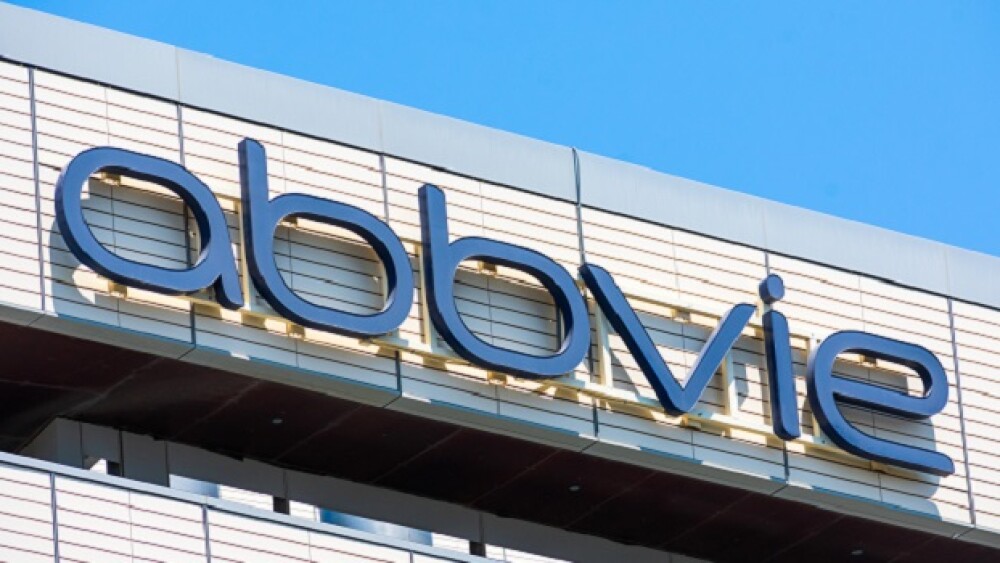The company’s blockbuster JAK inhibitor, alone or as a combination therapy, showed durable improvements in systemic lupus erythematosus disease activity at 48 weeks.
Pictured: AbbVie sign on a building/courtesy of Adobe Stock, Michael Vi
In March, AbbVie announced that Rinvoq met its primary endpoint and would move on to a Phase III trial in systemic lupus erythematosus. Thursday, the Illinois–based company will present full data from the corresponding Phase II SLEek study at the European Alliance of Associations for Rheumatology 2023 conference, showing sustained durability at 48 weeks.
SLEek studied Rinvoq (upadacitinib), AbbVie’s blockbuster Janus kinase (JAK) inhibitor, alone or with elsubrutinib, a selective BTK inhibitor, in a combination therapy called ABBV-599.
The Rinvoq 30mg arm and ABBV-599 high-dose groups met the study’s primary endpoint, reducing disease activity by at least four points on the SLE Responder Index (SRI-4), while patients were maintained on a steroid dose of 10mg prednisone or the equivalent once daily at 24 weeks. Overall flares and time to first flare were substantially reduced in these groups after 48 weeks of treatment, AbbVie reported Wednesday.
The 48-week data showed that Rinvoq maintained greater improvements in disease activity on the SR1-4, British Isles Lupus Assessment Group-Based Composite Lupus Assessment (BICLA) and the Lupus Low Disease Activity State (LLDAS).
The trial consisted of 341 people with moderately- to severely active systemic lupus erythematosus (SLE), a complex autoimmune disorder wherein the immune system attacks its own tissues, leading to inflammation and tissue damage in several organs.
After 24 weeks, trial arms where participants received the low dose of ABBV-599 and elsubrutinib 60mg were discontinued due to lack of efficacy. AbbVie reported no new safety signals.
No Added Benefit from BTK-JAK Combo
Despite the ABBV-599 high-dose cohort meeting the mark in Phase II, AbbVie chose not to progress the combination to Phase III. Alvina Chu, executive medical director of immunology clinical development at AbbVie, explained the company’s reasoning.
“The data will show that although both arms did show significant differences versus placebo, there really wasn’t a significant or substantial contribution with the BTK [inhibitor] on board,” Chu told BioSpace. “In order to move forward with a combination, we do need to show that there is a substantial contribution from both of the products alone.”
Mary K. Crow, professor of medicine at Weill Cornell Medical College, who was not involved in the study, said the Rinvoq aspect of the trial looks promising.
“It makes sense that [Rinvoq] might have some efficacy given the importance of JAK 1 as an interferon receptor signaling mediator [in lupus], she told BioSpace.
Crow said that, theoretically, there could be synergy drawn from targeting both the innate and adaptive immune systems. When B cells are activated and then differentiated to autoantibody-forming cells, they produce autoantibodies that are important mediators in lupus, she said. BTK is an important signaling molecule in B cells and its inhibition might inhibit their activation. Meanwhile, the JAK signaling pathway is important for the development and function of both innate and adaptive immunity.
However, “I have not seen any very compelling data for any of the BTK inhibitors that have been studied with regard to efficacy” in inhibiting B cell activation, Crow said.
Chu concurred, saying that while AbbVie had hoped combining Rinvoq with elsubrutinib would enhance the potential of a robust response in SLE, it “unfortunately did not provide the additive effect that we had been hoping.”
“Theoretically, you would think that using both of those agents together would kind of blanket all the different lupus pathogenesis pathways,” Chu said. But she suggested that in this case, “JAK inhibition is already ubiquitous enough that it is already covering a lot of the pathways, so we’re not really seeing that much more of an effect with an additional agent.”
Chu said Rinvoq’s durability in SLE would be highlighted in AbbVie’s oral presentation on Thursday, noting that the differences versus placebo seen at 24 weeks carried through to 48 weeks.
Looking ahead to Phase III, which will consist of two trials, BICLA will serve as the primary endpoint, and Chu said that improvement will also need to be noted by the physician through a physician-global assessment measure.
Heather McKenzie is a senior editor at BioSpace, focusing on neuroscience, oncology and gene therapy. You can reach her at heather.mckenzie@biospace.com. Follow her on LinkedIn and Twitter @chicat08.






